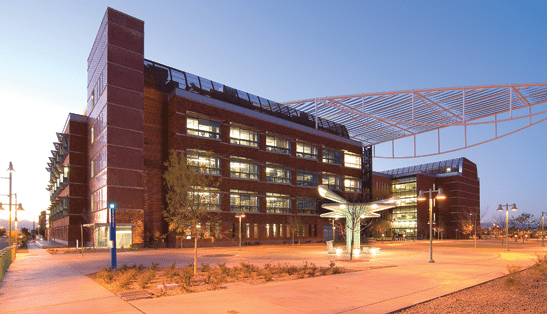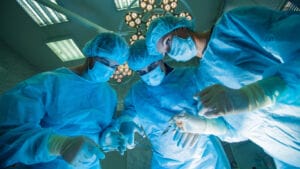There’s no doubt Arizona’s public and private sectors have worked hard this decade to turn the state into a high-profile player in bioscience. And there’s no question these efforts have paid off with a number of successes. But no chart, report or press release drives these points home as effectively as an experience enjoyed by some Arizonans attending the BIO 2008 International Convention held in San Diego last June.
The annual event, staged by the Biotechnology Industry Organization, attracted more than 20,000 industry leaders from 70 countries and 48 states. A sizeable contingent stationed at the Arizona pavilion included, among others, representatives from the Arizona BioIndustry Association, the Department of Commerce, all three major universities, several Arizona cities, private firms, the Flinn Foundation, the Mayo Clinic, Science Foundation Arizona and TGen Drug Development Services, an affiliate of the Translational Genomics Research Institute.
Brad Halvorsen, the Phoenix-based Flinn Foundation’s assistant vice president for communications, is one of the people who noticed a difference this year.
He’s been to the last four BIO conventions and remembers the first time around when people were asking “Arizona does bio?” This year, however, visitors to the Arizona pavilion were inquiring about such specific topics as who at TGen works with proteomics.
This, according to Halvorsen, demonstrates a growing awareness that “Arizona’s not only a bioscience player, but an increasingly substantial one as far as what we’ve been able to do, not only here in-state, but on the national and international level.”
Of course, none of this would be possible without a coordinated effort — one in which the Flinn Foundation plays a major role.
Saundra Johnson, Flinn’s executive vice president, came onboard in 2000, just as the privately endowed foundation was going through an 18-month strategic planning process that culminated in a multimillion-dollar, 10-year commitment to advancing the biosciences in Arizona.
“That was based on a great deal of background work that staff and consultants had done about the tremendous potential at our research institutions,” Johnson says. “And we really believed that … bioscience and life sciences would be a wonderful opportunity for Arizona to build on those core competencies and really leapfrog into a more knowledge-based economy.”
The Flinn Foundation became one of the first and most significant contributors to a statewide effort to help geneticist Jeffrey Trent launch TGen, a nonprofit research institute focused on early disease diagnostics and treatments, and to lure the International Genomics Consortium here. The IGC is a research foundation working to fight cancer and other complex diseases by, in part, “expanding upon the discoveries of the Human Genome Project.” Both organizations have been sharing a Downtown Phoenix building since December 2004.
Maybe more important, the Flinn Foundation commissioned a Cleveland organization, the Battelle Memorial Institute’s Technology Partnership Practice, to conduct a 2002 study that resulted in Arizona’s Bioscience Roadmap. It’s a constantly evolving 10-year blueprint for helping Arizona achieve bioscience success.
Flinn found willing collaborators at all levels of government and in higher education.
“They have been wonderful partners and have embraced the Roadmap,” Johnson says. “Without strong public-private partnerships, you can’t succeed in the kind of work the foundation’s trying to do in terms of actually moving an economy in a direction very quickly.”
Sandra Watson, the Department of Commerce’s work force and business development director, sees several areas where the state has made major contributions to the effort, ranging from increased funding for university research and facilities to tax credits for those making early stage investments for qualified small businesses — especially in the biosciences.
In fact, the department has established the Arizona Innovation Accelerator Program, which combines a variety of grants, tax breaks and tools to help businesses evaluate, develop and commercialize technologies.
“What you’ll find in Arizona is that we are a very collaborative state,” Watson says. “We, along with our partners, have identified key targeted areas and are very focused on developing strategic initiatives around those areas.”
Despite current economic conditions, she is not aware of any plans to cut back current programs. Increased higher-education funding has helped propel the Biodesign Institute at Arizona State University, the BIO5 Institute at the University of Arizona and Northern Arizona University’s Strategic Alliance for Bioscience Research and Education.
The key is that state universities not only help educate a future bioscience work force, they have an active role in the business community. One of BIO5’s main objectives, for example, is to help take research from the labs to the marketplace, and it accomplishes this through material transfer, facility-use agreements and collaborative efforts to create new companies.
“What I hope is that the community knows that if they need something — research expertise, facilities, whatever — that they can start by contacting me or someone in BIO5, and we can help them find what they need to help their business,” says Nina Ossanna, BIO5’s director of business development and vice chair for AZBio, the statewide trade association.
To understand the growing strength of Arizona’s bioscience industry, one needs to understand its diversity. That starts with a short course on terminology. Too many people throw around the term “biotechnology” when they really mean bioscience or life science.
Biotech, according to the Flinn Foundation Web site, www.arizonabiobasics.com, is a subset of bioscience. It is technology based on biology, especially when applied to agriculture, medicine and food science. Many associate it most closely with research and development.
Bioscience, as defined by Battelle, is segmented into five distinct areas: agricultural feedstock and chemicals; medical devices and equipment; drugs and pharmaceuticals; hospitals; and research, testing and medical laboratories.
While some areas around the country are especially strong in biotech, Arizona seems to cover both the gamut and a lot of ground. The so-called Arizona Bio-Corridor stretches from Tucson to Flagstaff. But it would be remiss to leave out areas such as Yuma, where there’s a lot of agricultural work going on.
There’s also a great deal of synergy taking place in different regions. Consider Tucson, where the optics industry is nationally recognized. Local optics expertise is now resulting in microscopic-imaging instruments.
Barry Broome, president and CEO of the Greater Phoenix Economic Council, offers another benefit of bioscience.
“While we work and develop the bioscience sector, we actually make our health-care delivery system better,” Broome says. “And from our standpoint, we actually see it as something that basically creates a kind of economic wellness. So it’s not just about high-level employment.”
Broome points to the example of a diagnostics company that specializes in evaluating therapies for certain brain cancers. Beyond the economic benefit the company brings to the region, it helps physicians and hospitals make better treatment decisions for patients.
While an ample availability of venture capital remains a concern, there are a lot of positives to celebrate.
Three industry developments made their way into a 2008 report Battelle prepared for BIO.
One was the acquisition of Southern Arizona’s Ventana Medical Systems Inc. for more than $3 billion by Roche, the Swiss health care company. Another is the decision by Covance Inc., a respected drug development servicescompany, to build a major research facility in Chandler. And a third is medical-products manufacturer W.L. Gore & Associates Inc.’s decision to expand itsFlagstaff operation and make a move into the Greater Phoenix area.
“It’s really an exciting time to be around and look at the life-sciences industry,” says BIO5’s Ossanna.
For more information about Arizona’s bioscience presence, visit the following links:
azcommerce.com
flinn.org
tgen.org
biodesign.asu.edu
bio5.arizona.edu
arizonabiobasics.com
gpec.org
azbio.org




